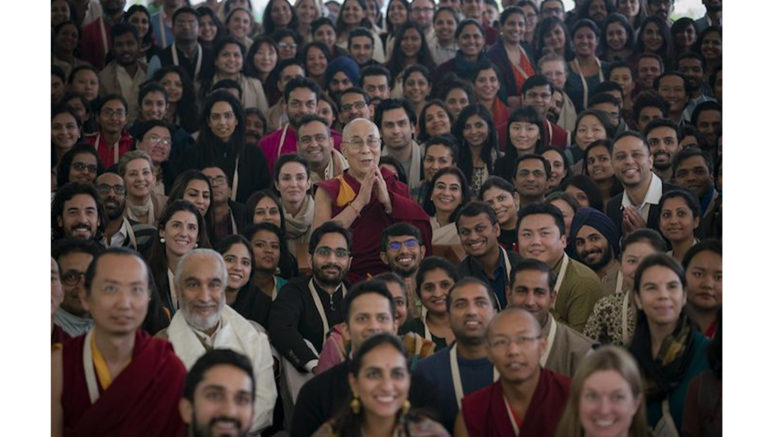The Tibetan spiritual leader His Holiness the Dalai Lama’s innovation in the Buddhist world and long-standing exploration with multiple dimensions of modern science has placed him in the rare pantheon of revolutionary thinkers.
Nalanda tradition is not a ‘religion’, it is a ‘science of the mind’, a statement he repeatedly made, drew an upsurge of interest in Buddhist study. It steered the best of modern academics towards an interdisciplinary Science and Buddhist discourse that eventually led to an understanding of the atlas of human mind and emotion.
His Holiness has always asserted that the basis of Tibetan Buddhist tradition is in the pure lineage of Nalanda.
The Tibetan tradition is derived from the works of great masters of Nalanda University, including Nagarjuna, Chandrakirti, Aryadeva, Shantarakshita and that thoroughly explains why of all the different Buddhist traditions, only Tibetans employ the Indian discipline of logic in their studies.
His Holiness the Dalai Lama, who has himself earned a doctorate in Buddhist Philosophy at age of 24, has since—for over 60 years—studied the works of the great masters.
Two years ago, he commissioned the reassessment of the text of direct teachings of Buddha, Kangyur, Commentaries of his teachings, Tengyur in three disciplines: Buddhist Science, Buddhist Philosophy and Buddhist Religion; the project in-pipeline would revolutionise the understanding and approach to Buddhism.
“This is the success story and the fulfilment of the vision of His Holiness the Dalai Lama,” said President of the Central Tibetan Administration, Dr Lobsang Sangay. “Throughout more than five decades in exile, His Holiness has vigorously engineered the revival of Nalanda based Buddhist monasteries in India, Himalayan regions, Buddhist countries abroad and inside Tibet.”
A spiritual heir to the Nalanda system of logic and pluralism, His Holiness has now committed the rest of his life towards the revival of the ancient Indian thought in modern India and at the core of his commitment lies the idea that ‘global secular ethics are more important classical religion’.
Nalanda’s tradition is India’s tradition
“Not only has been my physical home for the last nearly 59 years, but my mind is filled with Nalanda thought. I am proud to be a student of the Nalanda Tradition that is distinguished by its reliance on reason and logic. This tradition was introduced to Tibet in the 8th century by the erudite Nalanda scholar, Shantarakshita and we have kept it alive through extensive and rigorous study.
“The Nalanda tradition seems to be the most comprehensive presentation of the Buddha’s teachings available today. It incorporates knowledge of the mind and emotions which is of potential benefit to all humanity.
“From this tradition I have learned a correct view of reality and how to train my mind by tackling my disturbing emotions. And in our monasteries we have trained scholars who I have urged to learn English and Hindi to be able to teach and participate in education programs.”
On Global Secular Ethics
“Since a materialistic culture and materialistic way of life is fraught with problems and dissatisfaction, we need to adopt a different approach. I believe that combining ancient understanding of the workings of the mind and emotions with modern ideas of education can contribute to the creation of a more compassionate world.
“As someone who have studied ancient Indian knowledge for the last sixty years, I feel that modern education is not sufficient to bring genuine happiness. We should pay more attention to the ancient Indian knowledge to solve the emotional crisis prevailing in the world. Therefore, we should start teaching it as an academic subject rather than just treating it as a religion.
“Although much of the knowledge I speak of is to be found in Buddhist literature, it is not strictly Buddhist, but has a secular basis.”
On his fourth commitment
“Consequently, I will dedicate the rest of my life to reviving an understanding of India’s ancient knowledge in this country and trying to promote it through education.”

